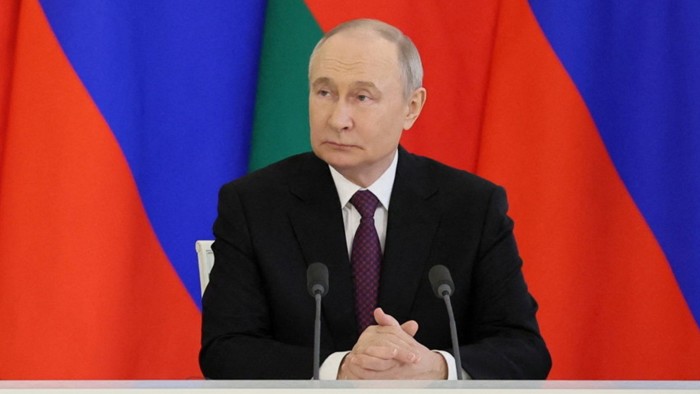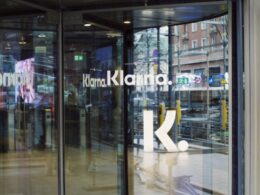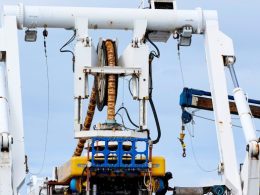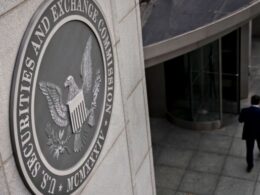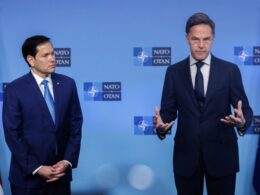Vladimir Putin has offered to halt his invasion of Ukraine across the current front line as part of efforts to reach a peace deal with US President Donald Trump, according to people familiar with the matter.
The Russian president told Steve Witkoff, Trump’s special envoy, during a meeting in St Petersburg earlier this month that Moscow could relinquish its claims to areas of four partly occupied Ukrainian regions that remain under Kyiv’s control, three of the people said.
The US has since floated ideas for a possible settlement that includes Washington recognising Russian ownership of Ukraine’s Crimean peninsula, the people added, as well as at least acknowledging the Kremlin’s de facto control over the parts of the four regions it currently holds.
The proposal is the first formal indication Putin has given since the war’s early months three years ago that Russia could step back from its maximalist demands to end the invasion.
But European officials briefed on US efforts to end the war cautioned that Putin would probably use the apparent concession as bait to lure Trump into accepting Russia’s other demands and forcing them on Ukraine as a fait accompli.
“There is a lot of pressure on Kyiv right now to give up on things so Trump can claim victory,” one of them said.
Ukrainian officials are due to meet European and US officials in London on Wednesday to discuss the latest proposals. However, Witkoff and US secretary of state Marco Rubio have pulled out of the meeting, according to US and European officials. Trump’s Ukraine envoy Keith Kellogg is still expected to attend. Putin’s foreign policy adviser said on Tuesday that Witkoff would visit Moscow later this week, according to Russian newswires.
Dmitry Peskov, Putin’s spokesman, told the FT: “Tense work is under way. We are talking to the Americans. The work is difficult and takes a lot of time, so it is difficult to expect immediate results, and the work cannot be done in public.”
Trump posted on social media on Sunday that he hoped Ukraine and Russia would “make a deal this week” and then “start to do business with the United States of America, which is thriving, and make a fortune!”
The US floated ideas the White House hopes could form the outlines of a possible deal at a meeting in Paris last week with European and Ukrainian officials. Ukrainian President Volodymyr Zelenskyy said on Tuesday that he had not received a proposal from Trump outlining specific steps towards ending Russia’s war. But he said that once a ceasefire was in place, he would be ready for direct talks with Putin.
“There are signals, ideas, discussions, but it isn’t an official proposition,” Zelenskyy said. If such an official proposition came, he said, “we will answer”.
Senior Ukrainian officials told the FT that they were amenable to some of the ideas floated by Trump and his team without specifying which in particular. The US proposals include deploying a European peacekeeping contingent in Ukraine as well as a separate, non-Nato military force to help monitor a ceasefire along a demilitarised zone spanning the entirety of the more than 1,000km frontline.
The force would work jointly with Ukrainian and Russian forces monitoring the armistice on their respective sides of the so-called line of contact.

Under a potential deal, Ukraine would pledge not to retake Russian-occupied territory by force, while Russia would agree to halt its army’s slow advance.
It is unclear whether Trump has asked Ukraine to formally recognise Russia’s annexation of Crimea. But Zelenskyy reiterated his position on the Black Sea peninsula on Tuesday, saying that: “Ukraine will not recognise the occupation of Crimea. It’s our territory, the territory of the people of Ukraine, there is nothing to discuss here.”
Russia has also rejected some of the US suggestions, including a military presence for Nato countries in Ukraine.
But people familiar with the matter said Putin would potentially be prepared to give ground on his previous demand for full control over the four frontline Ukrainian regions — Donetsk, Luhansk, Kherson, and Zaporizhzhia — if the US made broader geopolitical concessions to Moscow, such as recognising its control of Crimea and barring Ukraine from joining Nato.
Though Putin introduced constitutional amendments in 2020 barring Russia from relinquishing claims to any of its territory, Konstantin Remchukov, a Kremlin-aligned newspaper editor, claimed in a column published on Sunday that Moscow could end the fighting once it had driven Ukraine’s forces out of Kursk — a Russian region Kyiv partly took last year but which the Kremlin said on Saturday was now “99.5 per cent” under its control again.
“When they liberate the last half a per cent, then the troops can stop wherever they are when the news reaches them,” Remchukov wrote in Nezavisimaya Gazeta.
“It is thought Trump understands this, thanks to Witkoff. And it is hoped this will all happen by April 30 so he can proudly declare that he got his peace mission done in the first 100 days of his presidency.”
Putin declared the annexation of the four south-eastern Ukrainian provinces at a lavish ceremony in the Kremlin in September 2022, even though Russia controlled none of them in full at the time. Russia still does not fully control any of the four regions, although it has held the regional capitals of Donetsk and Luhansk since its first covert invasion of eastern Ukraine with the use of local proxy forces in 2014.
Though Russia retreated from some of the territory it occupied in autumn of 2022, Putin said last year that he would not accept any peace deal unless Ukraine withdrew its troops from the front lines and gave Russia full control over the four provinces — including Zaporizhzhia city, a 700,000-strong industrial town that Russia has never held, but regularly attacks.
Previous Russian demands for a peace deal have included a pledge from Ukraine to remain neutral and abandon its Nato aspirations, recognition of Russian claims over annexed territories, Western sanctions relief and a reduction of Nato forces in member states close to Russia.
A State department spokesperson said they could not comment on the “substance of the negotiations”.
Additional reporting by James Politi in Washington and Fabrice Deprez in Kyiv
Source link





